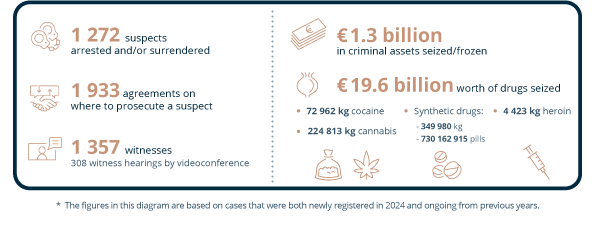
With criminal networks increasingly operating across continents and currencies, international judicial cooperation is more vital than ever. In 2024, Eurojust expanded its global partnerships, and will continue to do so, to deliver justice and protect communities, says the Agency’s Annual Report, published today.
Over the past five years, Eurojust’s case workload has increased by more than 60%. In 2024 alone, the Agency handled nearly 13 000 cross-border crime cases. This reflects the unprecedented pace at which organised crime in Europe is evolving, as well as national authorities’ reliance on Eurojust to support complex international investigations.
Eurojust President, Michael Schmid, commented: With a consistently high number of cases in recent years, our need for close cooperation with prosecutors and judges – both within Europe and beyond – is greater than ever. Thanks to our expanded global partnerships in 2024, we can ensure that criminals are held accountable and citizens are kept safe.
To further strengthen the fight against organised crime, Eurojust launched the European Judicial Organised Crime Network (EJOCN) in September 2024. This expert hub goes beyond investigation-based collaboration and combats organised crime strategically. Even closer cooperation and direct dialogue between judicial authorities will help to resolve legal challenges and align judicial strategies when investigating and prosecuting organised crime.
The EJOCN’s first priority is combating drug-related organised crime connected to European ports – key transit points for cocaine and other narcotics destined for the EU. Drug trafficking has been identified as the leading criminal activity in Europe, involving 50% of all criminal networks. The supply of illicit drugs continues to rise, as does the associated violence, making drug trafficking one of the most dangerous and lucrative crimes in the EU.
Successfully tackling the rise in drug trafficking requires close cooperation with judicial authorities in Latin America, where most narcotics smuggled into Europe originate. In 2024, Eurojust took a significant step in enhancing ties with Latin American partners by signing six Working Arrangements with the Prosecution Services of Bolivia, Chile, Costa Rica, Ecuador, Panama and Peru. These agreements will strengthen cooperation in key areas such as drug and arms trafficking, human trafficking, money laundering and cybercrime.
Over the past three years, the number of Eurojust supported joint investigation teams involving Latin American countries has steadily increased, with Brazil participating in the highest number. In 2024, Latin American countries participated in three times as many coordination meetings on organised crime and drug trafficking cases as in 2023.
In addition to its Latin American partnerships, Eurojust works with a broad range of third countries to ensure that national borders do not hinder the prosecution of crime or the delivery of justice. The Agency’s recently adopted Strategy on Cooperation with International Partners reinforces Eurojust’s role as a gateway for cross-border judicial cooperation within and beyond the EU.
In 2024, 1 022 newly opened cases handled by the Agency involved one or more third countries. Eurojust’s international cooperation continues to increase the number of registered cases at the Agency, with 378 new cases owned by third countries opened in 2024 alone. The United Kingdom, followed by Switzerland and Albania, were the non-EU countries involved in the most cases at Eurojust in 2024.
Third countries with the highest participation in Eurojust cases in 2024
During the year, international agreements on cooperation with Eurojust were signed with Armenia and Bosnia and Herzegovina, while the United Arab Emirates joined as a new member of the Agency’s network of Contact Points. In March 2024, Eurojust welcomed its first Liaison Prosecutor for Iceland, strengthening cooperation with Icelandic judicial authorities. Enhanced collaboration with South Partner and Western Balkan countries was also achieved through the EuroMed Justice and Western Balkans Criminal Justice projects, both supported by Eurojust.
Eurojust’s expanded global network enabled the Agency to deliver impressive operational outcomes in 2024. It contributed to the arrest of more than 1 200 suspects and the seizure and freezing of criminal assets worth over EUR 1 billion. The Agency also contributed to the seizure of drugs worth almost EUR 20 billion.
 Reflecting the growing scale of the challenge, the criminal investigations handled by Eurojust in 2024 involved more than three times as many victims and almost double the financial damages compared to 2023. Moreover, the Agency supported 25% more joint investigation teams than in the previous year.
Reflecting the growing scale of the challenge, the criminal investigations handled by Eurojust in 2024 involved more than three times as many victims and almost double the financial damages compared to 2023. Moreover, the Agency supported 25% more joint investigation teams than in the previous year.
The top three crime types handled by the Agency in 2024 continued to be swindling and fraud, drug trafficking and money laundering. Notably, the number of core international crime cases rose by 40%, while cybercrime cases increased by one-third and intellectual property crime cases by 20%.
Overview of Eurojust-referred cases by crime type in 2024
Eurojust continued to support national authorities through the organisation of 640 international coordination meetings and 32 coordination centres, as well as operational support for 361 joint investigation teams – over half of which were funded by the Agency. Eurojust also assisted with executing judicial cooperation tools such as European Arrest Warrants and European Investigation Orders, helping national authorities bring offenders to justice and deliver real results for victims and communities.
More information:
Eurojust Annual Report 2024:
Key visuals:
Key cases in 2024:
- Transatlantic cocaine trafficking route by air and sea halted: 23 arrests
- Eurojust’s support to accountability efforts following the full-scale invasion of Ukraine
- Action against criminal network smuggling Syrian migrants via Balkan route: 29 arrests
- Malware targeting millions of people taken down by international coalition
- Four arrests and nine companies seized in anti-mafia operation in Italy and Brazil
